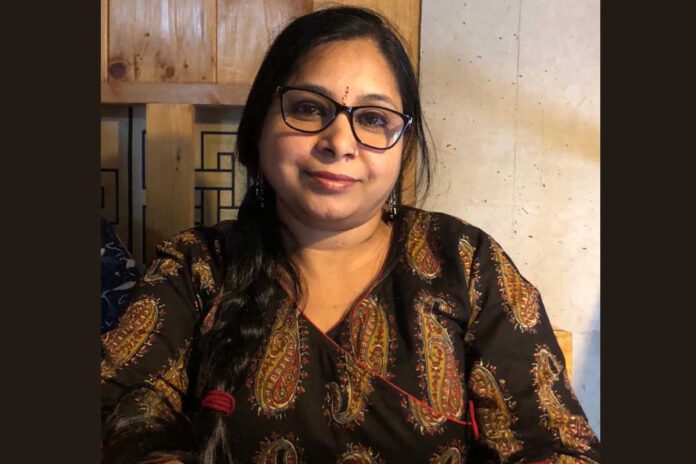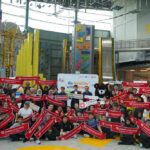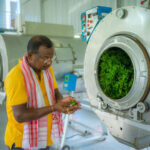(views expressed here are personal and do not necessarily reflect those of ActionAid Association)
COVID-19 has shaken the foundations of a happy childhood, play and school. Not that every child had a happy childhood before COVID-19, but the pandemic has disrupted the lives of each and every child in different ways. And especially for the vast section of children belonging to the poor and the marginalized sections of our society. The loss of employment and wages, depletion of savings and the added burden of borrowings faced by their parents, have rendered the lives of these children even more precarious. These are the children of the huge army of people in informal work in our country – the migrant workers, people called “wage hunters and gatherers” in search for daily work, and people who are“frontline workers” helping the rest of us cope with COVID-19 and lockdowns, but never considered as such. These are parents who constitute 90% of India’s work force.
With the schools being shut for over 18 months now, the mental and physical well-being this space provided to children, and particularly to girl children, has been denied to them. Mid-day meals that these children received is no longer available. The shift to on-line classes, in the context of the existing digital divide, means loss of access to education and learning. The Ministry of Rural Development says only eight per cent of the households have access to online education.
Another dark feature of COVID times has been the rise in incidences of malnutrition, child abuse, child labour, child marriage and child trafficking. We know this through ActionAid Association’swork with children in over 60 districts across the states of Bihar, Jharkhand, Rajasthan, Odisha, Uttar Pradesh and West Bengal. Working with the district administration we have managed to stop hundreds of child marriages, and helped in the rescue of some children being forced into labour, but recognize that these represent only a fraction of the children who may have got trapped into labour or early marriage.
COVID has not create the vulnerability that these children face, it has only exacerbated it. The NFHS 5th round data available for 22 states about the situation just before the COVID induced lockdown, clearly shows the worsening of nutrition status in several states.
ActionAid Association has been working hard to spread the child rights message within vulnerable communities, helping households and the community to build a more enabling context for their children. Together we focus on ensuring that children in the community are able access nutrition and education, and are aware of constitutional values and their rights.
These include children of those engaged in so called unclean and stigmatized work, such as manual scavengers and sex workers, children in conflict situations. ActionAid Association has also engaged with children on the streets, runaway children with or without adult care and protection, the girl child, children with disability.
ActionAid Association has led several innovative initiatives in different regions to strengthen public education. These include the NaiPahal initiative in 30 districts in Uttar Pradesh. During COVID times nearly 2,000 education volunteers were able to reach out to 45,258 children in 3,822 villages, in the process identifying 3,761 out-of-school children, several of them are from migrant families. The education volunteers are running ‘Mohalla Pathshalas’ in villages so children remain connected with education and learning.
Similarly, the KhilteeKaliya initiative in Mewat where the thousands of girls from the Meo Muslim communities came out as the empowered first-generation learners.
ActionAid Association engages with children to build their agency. This is done with different age group categories of children – ensuring participation of girls and young women in mixed groups and exclusive girl’s groups. Thus, sakhi saheli groups, kishori mandals, sakha clubs have been formed across the country and especially the Savara youth group in Delhi and the Antaranga clubs in Kandhamal in Odisha.
We have run campaigns to provide much needed counselling to students and help them access various scholarship programmes set out by governments to reach out to vulnerable communities. The Act for Scholarship campaign reached out to more than 50,000 students across 55 districts on Uttar Pradesh, Haryana, Punjab, Delhi NCR, Rajasthan and Himachal Pradesh, helping more than 14,000 students in filling up and filling applications for scholarships.
ActionAid Association recognizes the need to strengthen the social security system in the country with free and quality education, health care and food for all children. There is need to conduct trainings and do capacity building of Anganwadi workers, teachers, community and school management committees, to building sensitivity and perspective around differential needs, easing of processes and working towards integration and convergence of various concerned departments working in tandem with each other. Thus the Child Welfare Committees, the District Child Protection Committees, the Anti-Traffickig Units, Integrated Child Protection Services and so on, all need to work in tandem for children’s protection, development and overall well-being.
An all-round approach with strong collaboration among all key players – the local administration, various concerned departments, communities, adequate budgetary investments and above all building active agency of children will help make strides in the right direction.
Our experience tells us that while it is important to ensure the general wellbeing of all children and ensure access to nutrition, health, protection and educational opportunities for all children, a need which is made more urgent in the times of the pandemic, there is also need create special focus, special provisions and special instruments for specific categories of children. The one-size-fit-all approach will not serve here.
Through the long decades of working with different categories of children, ActionAid Association has been able to create different models of engagement to address the specific vulnerabilities of different categories of children and in creating spaces for their play, learning and physical and mental well-being and development.
These initiatives include the Kilkari centres for the nomadic tribes and de-notified tribes (NTDNT)in Jaipur, the100 child-friendly spaces in the Kashmir valley, the MakkalaGram Sabhas in Karnataka, the Joyful Learning Centres in Mizoram.
Renewed and consistent efforts will be required with specific focus on specific vulnerabilities of children else the goals and promises we have made to our children as part of the SDGs will remain a distant dream. Let us take the COVID pandemic as a wake-up call to work together for our children – all of them.















